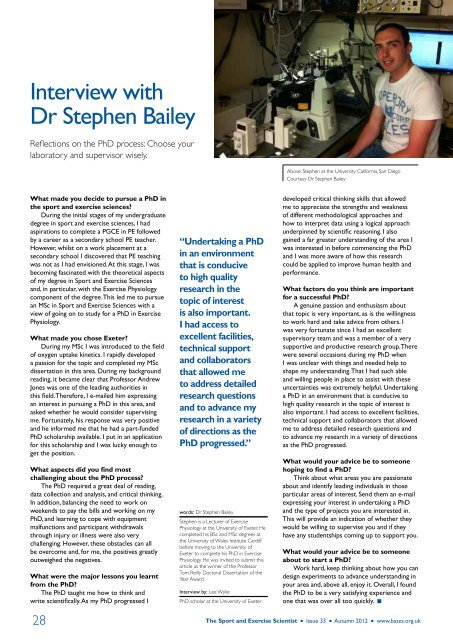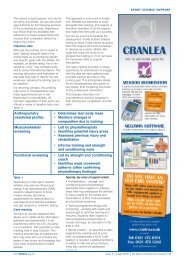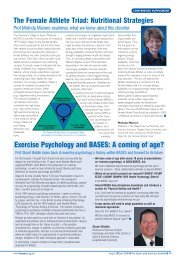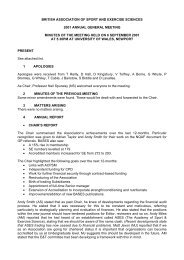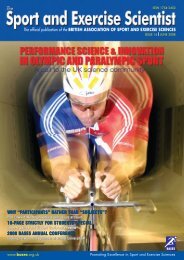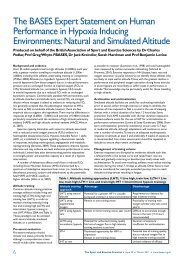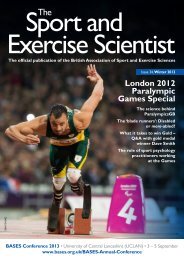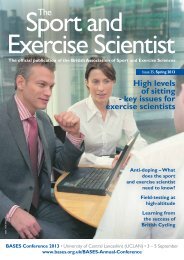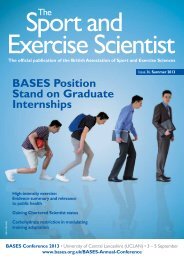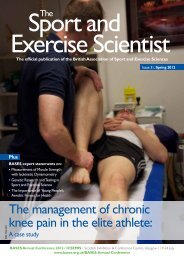Issue 33 Autumn 2012 - Bases
Issue 33 Autumn 2012 - Bases
Issue 33 Autumn 2012 - Bases
- No tags were found...
Create successful ePaper yourself
Turn your PDF publications into a flip-book with our unique Google optimized e-Paper software.
Interview withDr Stephen BaileyReflections on the PhD process: Choose yourlaboratory and supervisor wisely.Above: Stephen at the University California, San DiegoCourtesy Dr Stephen BaileyWhat made you decide to pursue a PhD inthe sport and exercise sciences?During the initial stages of my undergraduatedegree in sport and exercise sciences, I hadaspirations to complete a PGCE in PE followedby a career as a secondary school PE teacher.However, whilst on a work placement at asecondary school I discovered that PE teachingwas not as I had envisioned. At this stage, I wasbecoming fascinated with the theoretical aspectsof my degree in Sport and Exercise Sciencesand, in particular, with the Exercise Physiologycomponent of the degree. This led me to pursuean MSc in Sport and Exercise Sciences with aview of going on to study for a PhD in ExercisePhysiology.What made you chose Exeter?During my MSc I was introduced to the fieldof oxygen uptake kinetics. I rapidly developeda passion for the topic and completed my MScdissertation in this area. During my backgroundreading, it became clear that Professor AndrewJones was one of the leading authorities inthis field. Therefore, I e-mailed him expressingan interest in pursuing a PhD in this area, andasked whether he would consider supervisingme. Fortunately, his response was very positiveand he informed me that he had a part-fundedPhD scholarship available. I put in an applicationfor this scholarship and I was lucky enough toget the position.What aspects did you find mostchallenging about the PhD process?The PhD required a great deal of reading,data collection and analysis, and critical thinking.In addition, balancing the need to work onweekends to pay the bills and working on myPhD, and learning to cope with equipmentmalfunctions and participant withdrawalsthrough injury or illness were also verychallenging. However, these obstacles can allbe overcome and, for me, the positives greatlyoutweighed the negatives.What were the major lessons you learntfrom the PhD?The PhD taught me how to think andwrite scientifically. As my PhD progressed I“Undertaking a PhDin an environmentthat is conduciveto high qualityresearch in thetopic of interestis also important.I had access toexcellent facilities,technical supportand collaboratorsthat allowed meto address detailedresearch questionsand to advance myresearch in a varietyof directions as thePhD progressed.”words: Dr Stephen BaileyStephen is a Lecturer of ExercisePhysiology at the University of Exeter. Hecompleted his BSc and MSc degrees atthe University of Wales Institute Cardiffbefore moving to the University ofExeter to complete his PhD in ExercisePhysiology. He was invited to submit thisarticle as the winner of the ProfessorTom Reilly Doctoral Dissertation of theYear Award.Interview by: Lee WyliePhD scholar at the University of Exeterdeveloped critical thinking skills that allowedme to appreciate the strengths and weaknessof different methodological approaches andhow to interpret data using a logical approachunderpinned by scientific reasoning. I alsogained a far greater understanding of the area Iwas interested in before commencing the PhDand I was more aware of how this researchcould be applied to improve human health andperformance.What factors do you think are importantfor a successful PhD?A genuine passion and enthusiasm aboutthat topic is very important, as is the willingnessto work hard and take advice from others. Iwas very fortunate since I had an excellentsupervisory team and was a member of a verysupportive and productive research group. Therewere several occasions during my PhD whenI was unclear with things and needed help toshape my understanding. That I had such ableand willing people in place to assist with theseuncertainties was extremely helpful. Undertakinga PhD in an environment that is conducive tohigh quality research in the topic of interest isalso important. I had access to excellent facilities,technical support and collaborators that allowedme to address detailed research questions andto advance my research in a variety of directionsas the PhD progressed.What would your advice be to someonehoping to find a PhD?Think about what areas you are passionateabout and identify leading individuals in thoseparticular areas of interest. Send them an e-mailexpressing your interest in undertaking a PhDand the type of projects you are interested in.This will provide an indication of whether theywould be willing to supervise you and if theyhave any studentships coming up to support you.What would your advice be to someoneabout to start a PhD?Work hard, keep thinking about how you candesign experiments to advance understanding inyour area and, above all, enjoy it. Overall, I foundthe PhD to be a very satisfying experience andone that was over all too quickly.28 The Sport and Exercise Scientist n <strong>Issue</strong> <strong>33</strong> n <strong>Autumn</strong> <strong>2012</strong> n www.bases.org.uk


